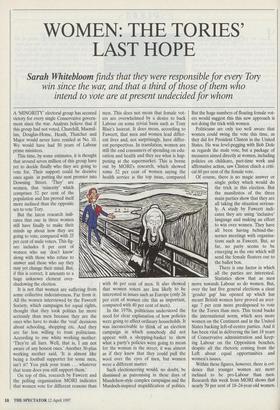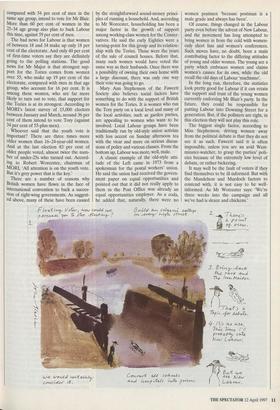WOMEN: THE TORIES' LAST HOPE
Sarah Whitebloom finds that they were responsible for every Tory
win since the war, and that a third of those of them who intend to vote are at present undecided for whom
A 'MINORITY' electoral group has secured victory for every single Conservative govern- ment since the war. Analysts believe that if this group had not voted, Churchill, Macmil- lan, Douglas-Home, Heath, Thatcher and Major would never have resided at No. 10. We would have had 50 years of Labour prime ministers.
But the latest research indi- cates that one in three women still have finally to make their minds up about how they are going to vote, compared with 25 per cent of male voters. This fig- ure includes 8 per cent of women who say 'don't know' along with those who refuse to answer and those who say they may yet change their mind. But, if this is correct, it amounts to a huge unknown element over- shadowing the election.
It is not that women are suffering from some collective indecisiveness. Far from it. All the women interviewed by the Fawcett Society, which campaigns for equal rights, thought that they took politics far more seriously than men because they are the ones who have to make the 'real' decisions about schooling, shopping etc. And they are far less willing to trust politicians. According to one white working mother: 'They're all liars. Well, that is, I am not aware of any honest ones.' Another 30-plus working mother said, 'It is almost like being a football supporter for some men, isn't it? You pick your team . . . whatever that team does you still support them.'
On top of this, research by Fawcett and the polling organisation MORI indicates that women vote for different reasons than men. This does not mean that female vot- ers are overwhelmed by a desire to back Labour on some trivial basis such as Tony Blair's haircut. It does mean, according to Fawcett, that men and women lead differ- ent lives and, not surprisingly, have differ- ent perspectives. In translation, women are still the end consumers of spending on edu- cation and health and they see what is hap- pening at the supermarket. This is borne out by MORI's research, which showed some 52 per cent of women saying the health service is the top issue, compared with 46 per cent of men. It also showed that women voters are less likely to be interested in issues such as Europe (only 26 per cent of women cite this as important, compared with 40 per cent of men).
In the 1970s, politicians understood the need for clear explanation of how policies were going to affect ordinary households. It was inconceivable to think of an election campaign in which somebody did not appear with a shopping-basket to show what a party's policies were going to mean for the woman in the street; it was almost as if they knew that they could pull the wool over the eyes of men, but women were a different matter.
Such electioneering would, no doubt, be dismissed as patronising in these days of Mandelson-style complex campaigns and the Murdoch-inspired stupidification of politics. But the huge numbers of floating female vot- ers would suggest this this new approach is not doing the trick with women.
Politicians are only too well aware that women could swing the vote this time, as they did for President Clinton in the United States. He was level-pegging with Bob Dole as regards the male vote, but a package of measures aimed directly at women, including policies on childcare, part-time work and affirmative action, saw Clinton clinch a criti- cal 60 per cent of the female vote.
Of course, there is no magic answer or single policy which would do the trick in this election. But the manifestos of the three main parties show that they are all taking the situation serious- ly. A study by Fawcett indi- cates they are using 'inclusive' language and making an effort to win over women. They have all been having behind-the- scenes meetings with organisa- tions such as Fawcett. But, so far, no party seems to be emerging as the one which will send the female floaters out to the ballot box.
There is one factor in which all the parties are interested. Statistics show that as men move towards Labour so do women. But, over the last five general elections a clear 'gender gap' has opened up which has meant British women have proved an aver- age 7 per cent more predisposed to vote for the Tories than men. This trend bucks the international norm, which sees more women on the Continent and in the United States backing left-of-centre parties. And it has been vital in delivering the last 18 years of Conservative administration and keep- ing Labour on the Opposition benches, despite all the rhetoric coming from the Left about equal opportunities and women's issues.
Within these figures, however, there is evi- dence that younger women are more inclined to be pro-Labour than men. Research this week from MORI shows that nearly 70 per cent of 18-24-year-old women, compared with 54 per cent of men in the same age group, intend to vote for Mr Blair. More than 60 per cent of women in the 25-34 age group also plan to back Labour this time, against 59 per cent of men.
The bad news for Labour is that women of between 18 and 34 make up only 18 per cent of the electorate. And only 40 per cent of first-time voters say they are definitely going to the polling stations. The good news for Mr Major is that strongest sup- port for the Tories comes from women over 55, who make up 19 per cent of the electorate, compared with men in that age group, who account for 16 per cent. It is among these women, who are far more likely to turn out to vote, that support for the Tories is at its strongest. According to MORI's latest survey of 15,000 electors between January and March, around 36 per cent of them intend to vote Tory (against 34 per cent of 55-plus men).
Whoever said that the youth vote is important? There are three times more older women than 16-24-year-old women. And at the last election 83 per cent of Older people voted, almost twice the num- ber of under-25s who turned out. Accord- ing to Robert Worcester, chairman of MORI, 'All attention is on the youth vote. But it's grey power that is the key.'
There are a number of reasons why British women have flown in the face of international convention to back a succes- sion of right-wing governments. As suggest- ed above, many of these have been caused by the straightforward sound-money princi- ples of running a household. And, according to Mr Worcester, householding has been a major factor in the growth of support among working-class women for the Conser- vatives. He said the early Eighties were a turning-point for this group and its relation- ship with the Tories. Those were the years of the sale of council houses. Before that, many such women would have voted the same way as their husbands. Once there was a possibility of owning their own home with a large discount, there was only one way their vote was going to go.
Mary Ann Stephenson of the Fawcett Society also believes social factors have something to do with the support of British women for the Tories. It is women who run the Tory party on a local level and many of the local activities, such as garden parties, are appealing to women who want to be involved. Local Labour groups have been traditionally run by old-style union activists with less accent on Sunday afternoon tea with the vicar and more on serious discus- sions of policy and various clauses. From the bottom up, Labour was more, well, male.
A classic example of the old-style atti- tude of the Left came in 1973 from a spokesman for the postal workers' union. He said the union had received the govern- ment paper on equal opportunities and pointed out that it did not really apply to them as the Post Office was already an equal opportunities employer. As a coda, he added that, naturally, there were no women postmen 'because postman is a male grade and always has been'.
Of course, things changed in the Labour party even before the advent of New Labour, and the movement has long attempted to bring women in from the cold with women- only short lists and women's conferences. Such moves have, no doubt, been a main contributing factor to the differing attitudes of young and older women. The young see a party which embraces women and claims women's causes for its own, while the old recall the old days of Labour 'machismo'.
In the long run, therefore, the statistics look pretty good for Labour if it can retain the support and trust of the young women currently endorsing Mr Blair's party. In the future, they could be responsible for putting Labour into Downing Street for a generation. But, if the pollsters are right, in this election they will not play this role.
The biggest single factor, according to Miss Stephenson, driving women away from the political debate is that they do not see it as such. Fawcett said it is often impossible, unless you are an avid West- minster-watcher, to grasp the parties' poli- cies because of the extremely low level of debate, or rather bickering.
It may well be the fault of voters if they find themselves to be ill-informed. But with the Mandelson and Murdoch factors to contend with, it is not easy to be well- informed. As Mr Worcester says: 'We're three weeks into the campaign and all we've had is sleaze and chickens.'



































































 Previous page
Previous page